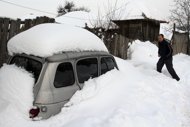Deep freeze claims more lives in Europe

At least 28 people froze to death overnight in eastern and central Europe, while countries further west and south began to feel the frigid effects of a cold front spreading from Siberia.
In Ukraine, officials said 13 people had died of hypothermia over the past 24 hours, bringing the overall toll there to 43 over the past six days.
Most were homeless people who froze to death on the streets, but seven died in their homes and more than 800 sought medical help for frostbite and hypothermia as temperatures plunged to minus 30 degrees Celsius (minus 22 Fahrenheit) in some regions.
Even Greece saw temperatures plunge past freezing in some places, leading to the death of at least one homeless man on the island of Crete and another fatality when an African migrant froze to death in the Evros river along the country's border with Turkey.
"We are praying that there will be no homeless deaths in Athens," said Dimitra Noussi, the supervisor at a shelter in the Greek capital. "We are doing the best we can, street teams are sent out every night with food and blankets, but it's not easy as these people are very vulnerable."
Poland reported five people found dead overnight, bringing the overall toll to 20 since temperatures plummeted there on Friday. The victims were mostly homeless.
Others died after getting drunk and falling asleep outdoors, police said, as officials reported temperatures diving to minus 30C in parts of the country.
In Slovakia, two people died as temperatures hit minus 24C (minus 11.2F), the daily newspaper SME reported.
And in the neighbouring Czech Republic, a 47-year-old homeless man was found frozen to death in the eastern city of Karvina, where the mercury has dipped to minus 29C (minus 20F).
In central Serbia, an 80-year-old man was found dead in the snow.
Italy struggled to clear motorways and railways after heavy snow falls that also blanketed the French Mediterranean island of Corsica.
In Romania, six people died over the past 24 hours, bringing the toll to 14 over the past six days, the health ministry announced. One of the victims was a baby who died in an unheated house in the northeastern town of Iasi.
A total of 346 people, homeless or suffering from hypothermia, have been taken to hospital or rescue centres over the past 24 hours as temperatures fell to minus 32.5C (minus 26.5F) in the centre of the country, officials said.
In Bulgaria, two people died in the coldest weather in a century in some parts of the country, bringing the overall toll to 10.
The temperature sank to minus 29.4C (minus 20.9F) in the northeastern city of Knezha and minus 31.4C in the northern town of Sevlievo.
Guntars Grauss, director of Latvia's state medical centre, told the Delfi news portal that five men and two women had died in the final week of January when temperatures were at their lowest.
In Italy, where bad weather halted all work around the beached cruise liner Costa Concordia, forecasters predicted more snow and colder temperatures in the days ahead, with a low of minus 20C (minus 4F) in the Alps.
In France, five men serving in the French Foreign Legion were buried by an avalanche while training in the Alps.
They were dug out by members of their brigade but one of the legionnaires died of a heart attack during the accident, the commander of French mountain troops Herve Wattecamps said.
Meanwhile, temperatures dipped to between minus 18C (minus 0.4) and minus 25C in parts of the north of the country.
Parts of north-east and central France have also been placed under "deep cold" watch until 7 a.m. (0600 GMT)
"We are seven degrees below the average of the season in both north and south," forecaster Dominique Raspaud said.
In Corsica, most mountain passes were closed by heavy snow and power cuts hit some 60,000 homes in the island and neighbouring French mainland.
But the Dutch were putting on their skates, staging the first marathon of the season on natural ice and hoping their canals would be sufficiently frozen to hold a classic 200-kilometre (125-mile race) for the first time since 1997.
What the stars mean:
★ Poor ★ ★ Promising ★★★ Good ★★★★ Very good ★★★★★ Exceptional
 Tag:
Tag:
Related Contents
Latest News
More News
- Russian President congratulates Vietnamese Party leader during phone talks (January 25, 2026 | 09:58)
- Worldwide congratulations underscore confidence in Vietnam’s 14th Party Congress (January 23, 2026 | 09:02)
- Political parties, organisations, int’l friends send congratulations to 14th National Party Congress (January 22, 2026 | 09:33)
- 14th National Party Congress: Japanese media highlight Vietnam’s growth targets (January 21, 2026 | 09:46)
- 14th National Party Congress: Driving force for Vietnam to continue renewal, innovation, breakthroughs (January 21, 2026 | 09:42)
- Vietnam remains spiritual support for progressive forces: Colombian party leader (January 21, 2026 | 08:00)
- Int'l media provides large coverage of 14th National Party Congress's first working day (January 20, 2026 | 09:09)
- Vietnamese firms win top honours at ASEAN Digital Awards (January 16, 2026 | 16:45)
- ASEAN Digital Ministers' Meeting opens in Hanoi (January 15, 2026 | 15:33)
- ASEAN economies move up the global chip value chain (December 09, 2025 | 13:32)






















 Mobile Version
Mobile Version